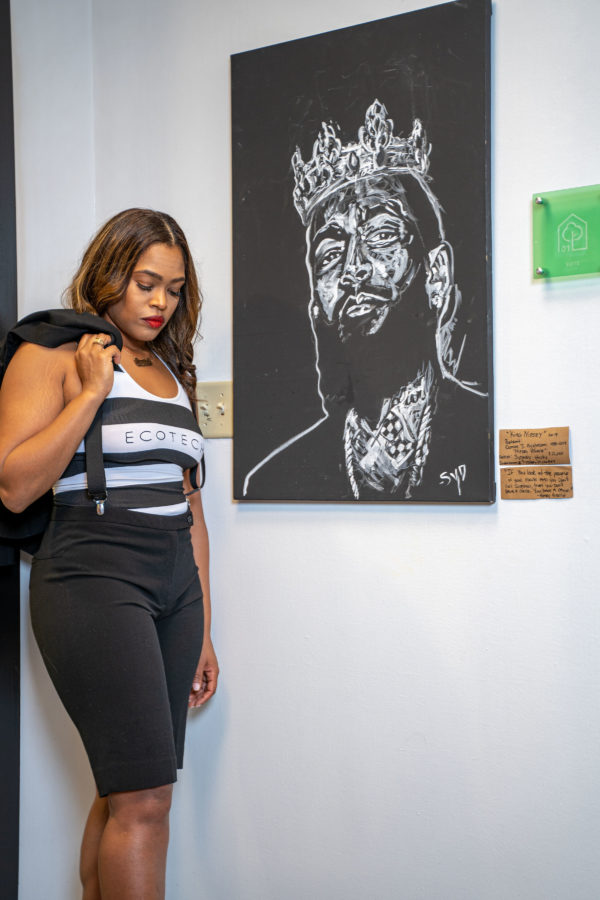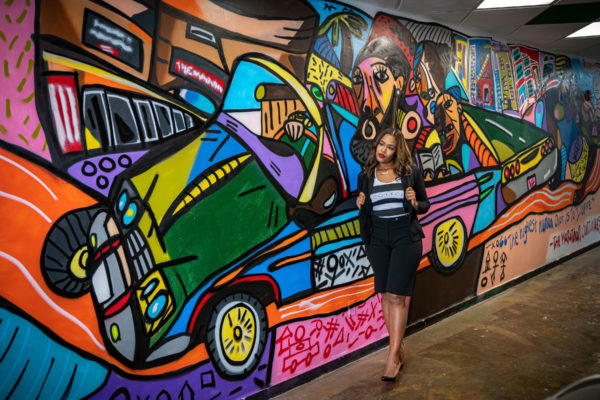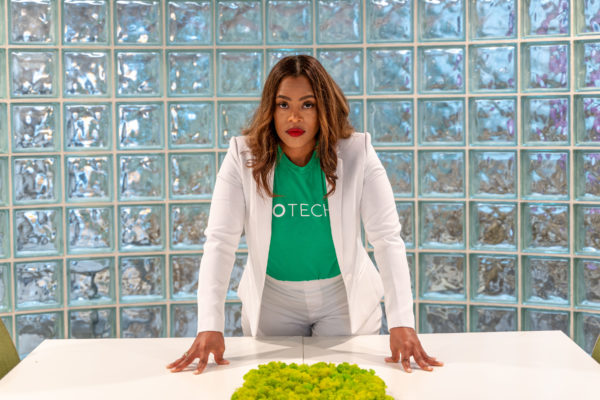Start-up founder Pandwe Gibson knew delving into the $300 billion industry of smart manufacturing wouldn’t be easy.
She is after all, a Black woman promoting circular economy goods, which is pretty much reusing what some consider trash to make products, and ultimately money.
“Fundamentally, people aren’t used to the message coming out of my body,” Gibson said.

That however, hasn’t stopped her from acquiring 16 business clients in the first six months of starting her company, EcoTech Visions, and bringing in about $25,000 in revenue each month.
The business is the overarching umbrella for what Gibson hopes will be a network of dozens of smart manufacturing facilities and incubators, which help small business owners and entrepreneurs launch and run their businesses.
“Think of us like Kinkos but eco-friendly,” she said in a recent interview with Atlanta Black Star.
Gibson said oftentimes entrepreneurs will have developed “a cool organic” hair-care product or drink, then put their item in plastic packaging.
“You know what plastic is made of,” she asked. “Oil.”
What these green businesses are packaging their products in is “literally made of a toxic chemical,” Gibson said.
Her company can help businesses access eco-friendly materials at low costs, and that’s just one example of the services the business owner provides.
She also started a nonprofit in 2015 dubbed the EcoTech Visions Foundation to train workers and help aspiring entrepreneurs create green businesses.
“We believe that manufacturing is the way to grow the middle class of America,” Gibson said in a promo video.
Aspiring entrepreneurs might not be able to afford expensive equipment to get their companies up and running.
“That’s the whole point of our nonprofit that we can purchase the equipment and subsidize the cost to the companies at a much lower price than market rate, so that they can actually bring products to market and they can be priced competitive.”
Gibson, who earned an MBA from the Massachusetts Institute of Technology and a Ph.D. from Claremont Graduate University, scaled more than 20 successful companies before creating her own.
She said that through EcoTech Visions, she helps entrepreneurs grow smart manufacturing for smart cities through an on-demand marketplace. It’s powered by artificial intelligence, blockchain technology and other technical systems.
“I think that we have the potential to create thousands of jobs,” she said.
The business owner started her company in 2015, 10 years after Hurricane Katrina left her hometown of New Orleans devastated.
The hurricane killed at least 986 people, flooded 80 percent of the city, submerged some areas by more than 10 feet of water and displaced more than a million people in the Gulf Coast region, according to an independent analysis from The Data Center.
Gibson said she watched her community lose their homes, economic viability and their residency.
“That literally changed my life,” she said.

At the time, Gibson was balancing work as an education specialist while working on a doctorate in special education and urban development at the Peter Drucker School of Management in California.
Her path to starting EcoTech Visions wasn’t a direct one. Her first start-up was a charter school network dubbed ReNEW Schools, which she grew to 16 schools before they consolidated.
Gibson said she was being recruited to open up similar programs in Washington and Philadelphia when she found out one of her students was murdered.
She was devastated.
“I had never lost a child,” she said.
Already faced with a student population composed of more than 50 percent of students living in foster and group homes, Gibson started to lose faith in the education system.
She said initially she was handed kids that other schools didn’t want and tasked with teaching them subject matter that didn’t apply to the service jobs they were faced with having to take.
She said that’s when she realized “you can’t create economic opportunities for children if you don’t serve adults.”

She parted ways with ReNEW Schools about five years ago and headed to Miami to try her luck at landing a job with the few contacts she had made there.
Gibson, however, had more than luck to run on.
She had knowledge.
She had attained three master’s degrees, including one from the Harvard Graduate School of Education, where she was trained in organizational scaling.
So she was able to apply the same skillset she used to scale her education network to help scale three of her friends’ businesses.
All the while, she continued developing a plan to form her own business.
By the time that plan took shape, she had saved $250,000 of her own money to launch EcoTech Visions, and she had her eye set on a $1.5 million building to launch her first makerspace.
Gibson said she put down $150,000, and, through what would become a trying process, eventually landed in the building.
She said she later opened another facility in Miami Gardens that together with the original facility gave her 52,000 square feet of space to help other entrepreneurs and the larger community.
When Hurricane Irma left Florida with a reported 15 million outages in 2017, Gibson’s building in North Miami was the only one in four miles with a generator that kept power on, Gibson said.
She opened up the facility’s doors as headquarters for disaster relief.
“We did it for free,” she said. “We did it for free because there’s a need.”
The businesswoman said there is still a need for such facilities in communities across the United States.
“You know the problems. You can solve them,” she said.
EcoTech Visions has partnered with 26 companies, working with the lab in a number of different ways.
Some of them need low-cost and sustainable solutions for packaging products. Some of them need help with manufacturing products, and some just need office space.
Many companies have to outsource to China, but Gibson said the benefit of being located locally is the ability to respond to their needs as they come up.
“So when a hurricane comes and [businesses] needs more space, we give it to them,” Gibson said.
She hopes to expand her company to include 102 facilities by 2025.




